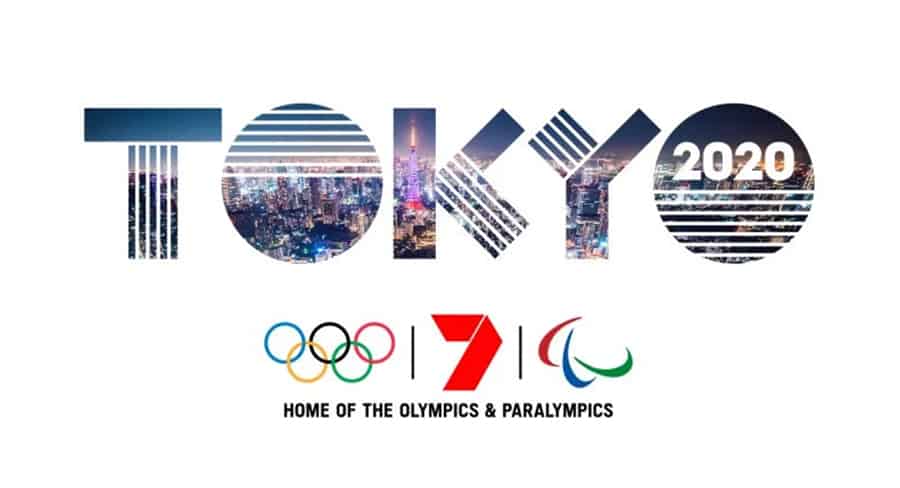With the Covid-19 pandemic delaying the Tokyo 2020 Olympics by a full year, the athletes touching down in Japan felt like a major success in itself.
Japan went ahead with the Games during a state of emergency due to a rise in Covid-19 cases, and as a result, Olympic venues in Tokyo, Chiba, Kanagawa and Saitama didn’t host fans during the Games.
In Australia, the Games came as half of the country was enduring lengthy lockdowns. The hope and triumph of the Olympics and Paralympics was a balm to endless press conferences full of bad news, and that was reflected in the ratings. From the Opening Ceremony July to the Closing Ceremony, 20.2 million Australians watched Seven’s broadcast of Tokyo 2020, and the average full day broadcast audience was up 80% on Rio 2016 in the capital cities and up 71% nationally.
Jul 12: Countdown to Tokyo: Seven finds brands still have massive Olympic appetite
By James Manning
There are just nine days to go until Seven broadcasts the first Olympic events. Two days before the Opening Ceremony, Seven will be broadcasting softball and football, including a match featuring the Matildas on Wednesday night.
Seven is calling it Big Wednesday with some justification. It will also be the day the winning bid for the 2032 Olympic Games is announced. “The winner is Brisbane” is what many will be hoping to hear.
But wait…there’s more. Seven will also broadcast the final of The Farmer Wants a Wife season two on Wednesday night.
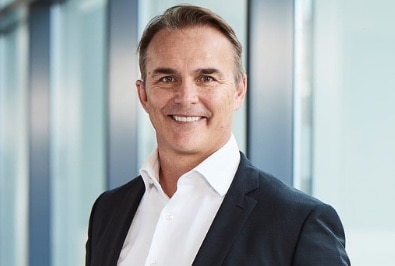
Kurt Burnette
Seven West Media chief revenue officer and director of Olympics Kurt Burnette told Mediaweek the Tokyo Olympics had not been without its challenges. “It’s not often you get the chance to do two Olympics in 12 months and I hope we never do again.
“We had some sponsors who pulled out last year and others who came on for this year. One category which was challenged was travel and we lost a couple of sponsors there. For some others the timing of the change just didn’t work.
“When you look at the sponsors, 60% of the clients with us for Tokyo are different to those in Rio in 2016. It just shows you how much brands and the ad market is changing.
“This time we not only have big partnerships and sponsorships, but there are smaller packages, some of which are still available now, with digital only options from $10,000 through to other packages worth multiple millions.
“Because of the way the Tokyo Olympics will be covered we have opened it up for more brands to be a part of the Games. We are able to better understand how the audience is moving from broadcast to digital which allows different entrants into the marketplace as people choose to take a digital-only or linear only option or a combination of both.
“There have been some really brave marketers and it will pay dividends for them as they are part of a significant moment in time.
“This will be the biggest digital event in Australian media history.”
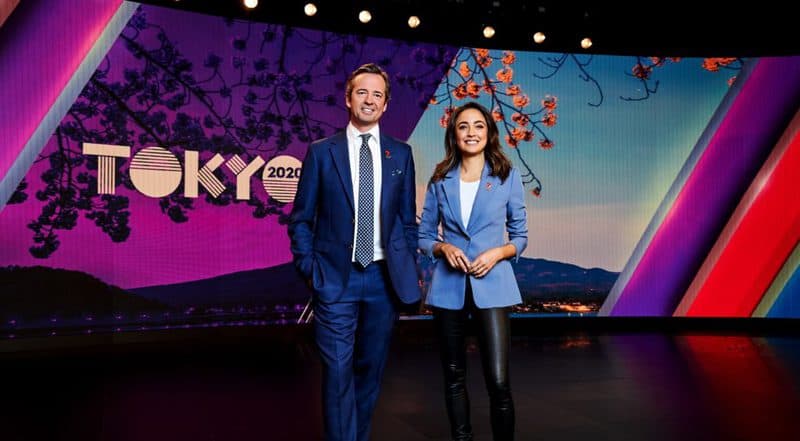
Seven Olympic hosts Hamish McLachlan and Abbey Gelmi
See also: Seven unveils Olympic Games Tokyo 2020 partners + national & local sponsors
Burnette said Seven will exceed the record revenue it wrote for the Rio Olympics.
The financial impact of the games means Seven starts off the new financial year with a cracking quarter July to September.
“It’s good for television too because the TV market is booming again into the first quarter,” said Burnette. “We also get to launch our new shows like The Voice and SAS Australia and it promotes our winning 7News proposition.”
Short term opportunities
Burnette said at the start of every Olympic Games there has always been some inventory still available. “We have always sold multiple millions of dollars during the games. With things like border closures and other Covid impacts, people are making late decisions on campaigns.
“We are placed very well with the Tokyo Games and we have hit our budget number. That talks to the wonderful job our team has done, but also how in a world of fragmentation, the Olympics remains so strong. We can deliver a guaranteed mass audience and targeted audiences via digital.”
VOZ is here
During the games Seven will be able to share what Burnette called “one holistic metric” with a combination of linear and digital with a de-duplicated total. “It will note co-viewing (people watching together) and give a true total reach of broadcast and digital together.”
Seven Olympic hospitality
Burnette has been to many of the 12 Summer and Winter Games. As a young sales executive he started with Seven in 1990. He made it to the 1996 Atlanta Games, but on his own dime when he stopped in on the way to his wedding in England.
He was of course on hand for Sydney 2000 and most of the subsequent Olympic events.
Although Seven won’t be taking advertising partners to Tokyo, it has set us hospitality facilities in Sydney and Melbourne, and will take people through the studio set-up in Melbourne when possible.
Innovation
There will be more addressability than ever for brands using the Olympics. Using Seven’s data stack on 7REDiQ (using data from Mastercard, Ticketek and Flybuys) this is the first time Seven will use targeting on connected televisions. About 65% of the digital streams on 7plus come through connected television.
7ACT will further the premium ad experience by allowing brands to insert dynamic QR codes into video assets.
Burnette: “We are going to use VOZ to measure broadcast and digital and we are working with Adgile Media who are able to do real time tracking of the broadcast and digital ads and then track that back directly to any online behaviour.”
How to watch
There will be plenty for people looking at the Tokyo Games on Seven linear channels Seven and 7mate. For those who want more there will be 45 digital channels to access on 7mate. That will include the broadcast channels of course, plus dedicated channels for all Olympic sports.
Hosting will come out of Seven’s Melbourne studios on a new set that recently arrived from overseas.
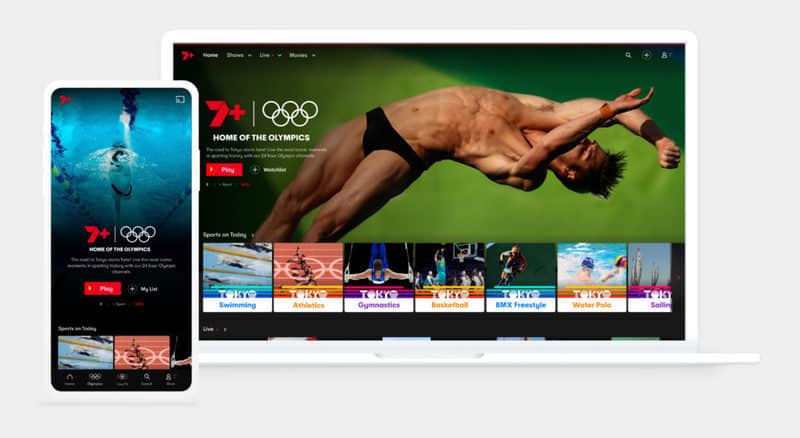
Burnette: “The 7plus product has been built from scratch and this is the first time the Olympics has been inside 7plus. For Rio we had a separate standalone app built by third parties.”
Consumers can make a watchlist of sports that will be updated every time they visit 7plus. Personalisation even lets users choose a specific language for subtitles if they wish.
7plus already has a portfolio of 16 live channels including a live Olympic Channel that has been running for some time.
All the Olympic sports channels are also ready to go and currently have on-demand events on offer.
“We are aiming to get 11m registered users.” The broadcaster only turned on mandatory sign-on for live streaming from 7plus two weeks ago. Burnette reminded Mediaweek the Tokyo Games will be completely free after there was a paywall experiment as part of Seven’s Rio 2016 coverage.
7NEWS.com.au is also an online destination for Olympic news, updates and insights.
Aug 8: Tokyo 2020 Olympic TV ratings highlights day by day
By James Manning
Seven’s Olympic TV ratings
Saturday August 7 Day 15
Morning 1.04m (Metro 755,000)
Afternoon 1.34m (Metro 1.0m)
Late afternoon 1.50m (Metro 1.06m)
Evening 1.76m (Metro 1.22m)
Night 2.13m (Metro 1.53m)
Late Evening 2.13m (Metro 1.61m)
Photo above: Seven’s track and field team – Bruce McAvaney, Tamsyn Lewis, producer/researcher Joshua Kay and Dave Culbert
Friday August 6 Day 14
Morning 804,000 (Metro 595,000)
Afternoon 1.20m (Metro 888,000)
Late afternoon 1.23m (Metro 903,000)
Evening 1.84m (Metro 1.28m)
Night 1.78m (Metro 1.26m)
Late Evening 1.72m (Metro 1.31m)
Thursday August 5 Day 13
Morning 797,000 (Metro 584,000)
Afternoon 1.29m (Metro 955,000)
Late afternoon 1.62m (Metro 1.18m)
Evening 2.35m (Metro 1.68m)
Night 2.92m (Metro 2.12m)
Late Evening 1.36m (Metro 1.01m)
Wednesday August 4 Day 12
Morning 807,000 (Metro 574,000)
Afternoon 1.15m (Metro 836,000)
Late afternoon 1.28m (Metro 910,000)
Evening 2.45m (Metro 1.72m)
Night 2.83m (Metro 2.06m)
Late Evening 1.38m (Metro 1.04m)
Tuesday August 3 Day 11
Morning 797,000 (Metro 571,000)
Afternoon 1.22m (Metro 886,000)
Late afternoon 1.23m (Metro 879,000)
Evening 2.09m (Metro 1.42m)
Night 2.36m (Metro 1.66m)
Late Evening 1.60m (Metro 1.21m)
Monday August 2 Day 10
Morning 776,000 (Metro 554,000)
Afternoon 1.24m (Metro 904,000)
Late afternoon 1.34m (Metro 971,000)
Evening 2.18m (Metro 1.49m)
Night 2.66m (Metro 1.94m)
Late Evening 1.63m (Metro 1.24m)
Sunday August 1 Day 9
Morning 1.43m (Metro 995,000)
Afternoon 2.44m (Metro 1.78m)
Late afternoon 2.11m (Metro 1.49m)
Evening 2.41m (Metro 1.68m)
Night 3.05m (Metro 2.21m)
Late Evening 1.77m (Metro 1.32m)
Seven News 2.59m (Metro 1.74m)
The national audience of 3.05m across Seven, 7mate and 7TWO is the biggest since the Tokyo 2020 Opening Ceremony.
The Sunday episode of Weekend Sunrise had its biggest audience this year – 738,000 (Metro 452,000).
Seven News had its biggest audience since September 2012, and the biggest Sunday audience since May 2011.
Saturday July 31 Day 8
Morning 1.31m (Metro 933,000)
Afternoon 1.92m (Metro 1.41m)
Late afternoon 1.89m (Metro 1.33m)
Evening 2.24m (Metro 1.57m)
Night 2.56m (Metro 1.84m)
Late Evening 1.53m (Metro 1.13m
Seven’s Saturday: The Olympic broadcaster had a 72.4% network commercial share from 6am until midnight. That is the best result from any network since OzTAM introduced the current rating system in 2001.
Seven’s Olympic TV ratings primary channel had a commercial share of 59.4% across those hours, the highest since 2004.
Friday July 30 Day 7
Morning 930,000 (Metro 660,000)
Afternoon 1.46m (Metro 1.06m)
Late afternoon 1.19m (Metro 841,000)
Evening 1.78m (Metro 1.22m)
Night 2.10m (Metro 1.51m)
Late Evening 1.19m (Metro 899,000)
Thursday July 29 Day 6
Morning 887,000 (Metro 635,000)
Afternoon 1.52m (Metro 1.12m)
Late afternoon 1.27m (Metro 893,000)
Evening 2.07m (Metro 1.39m)
Night 2.14m (Metro 1.53m)
Late Evening 1.07m (Metro 793,000)
Wednesday July 28 Day 5
Morning 1.01m (Metro 715,000)
Afternoon 1.60m (Metro 1.16m)
Late afternoon 1.31m (Metro 929,000)
Evening 2.33m (Metro 1.63m)
Night 2.55m (Metro 1.83m)
Late Evening 1.27m (Metro 897,000)
Tuesday July 27 Day 4
Morning 985,000 (Metro 720,000)
Afternoon 1.41m (Metro 1.05m)
Late afternoon 1.58m (Metro 1.13m)
Evening 2.20m (Metro 1.50m)
Night 2.16m (Metro 1.47m)
Late Evening 946,000 (Metro 681,000)
Sunrise 574,000 Biggest weekday audience of 2021
Monday July 26 Day 3
Morning 1.02m (Metro 716,000)
Afternoon 1.65m (Metro 1.19m)
Late afternoon 1.40m (Metro 989,000)
Evening 2.27m (Metro 1.61m)
Night 2.19m (Metro 1.61m)
Late Evening 1.09m (Metro 824,000)
The Olympics are starting to give Seven some impressive year-on-year comparisons.
For example: Seven Network is up 93% 25-54.
Sunday July 25 Day 2
Morning 1.42m (Metro 1.01m)
Afternoon 2.25m (Metro 1.67m)
Late afternoon 2.10m (Metro 1.50m)
Evening 2.51m (Metro 2.51m)
Night 2.75m (Metro 1.99m)
Late Evening 1.11m (Metro 853,000)
Seven’s night audience of 2.75m national was a new 2021 audience high.
Seven News Sunday evening also recorded its biggest audience of the year – 2.32m national (Metro 1.56m)
Seven West Media chief revenue officer and director of Olympics, Kurt Burnette, said: “The reaction from Australians to our exclusive, live and free coverage on Seven and 7plus has been extraordinary. The audience numbers have exceeded our forecasts on every level, including 2.3 million reach on 7plus alone.
“New viewing records are being set on a daily basis which is great news for our partners, sponsors and dynamic packages. Marketers have well and truly embraced Tokyo 2020 and now that the Games have started, we’re seeing record results with brands capitalising with short-term broadcast and digital investment.”
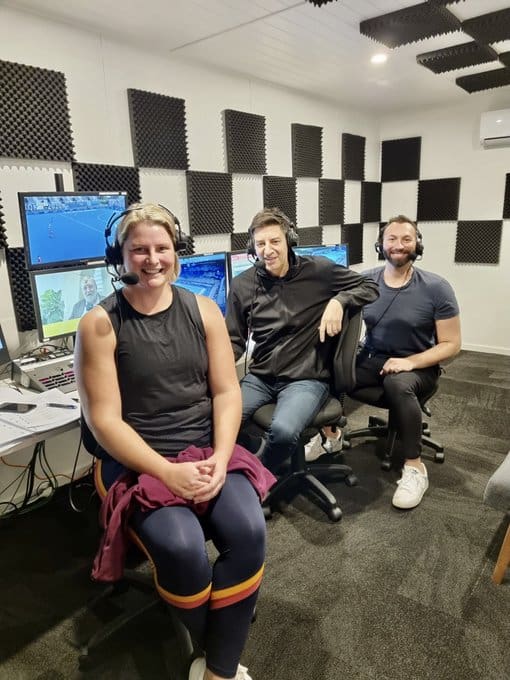
Seven’s Basil Zempilas (centre) commentating at the swimming with Leisel Jones and Ian Thorpe
Saturday July 24 Day 1
Sunrise 638,000 (Biggest audience of 2021)
Morning 1.08m (Metro 776,000)
Afternoon 1.57m (Metro 1.17m)
Late afternoon 1.82m (Metro 1.30m)
Evening 2.40m (Metro 1.73m)
Night 2.47m (Metro 1.78m)
Late Evening 1.39m (Metro 1.05m)
The first day of competition in the Olympic Games Tokyo 2020 saw the Seven Network’s 7plus platform claimed a gold medal of its own: the record for the biggest day of live streaming in Australian television history.
An extraordinary 238.7 million minutes were streamed on 7plus Saturday, shattering the previous record of 86 million for the State of Origin rugby league match on 14 July this year.
The 7plus total comprised 207.9 million live streamed minutes and 30.8 million video-on-demand minutes. As a result, 7plus captured a record-setting 93.5% share of commercial free-to-air live streaming, and an 80.9% share of total minutes (live plus VOD).
Saturday also marked a record for 7plus in terms of advertising revenue booked in one day.
Friday July 23 Day 0
Opening Ceremony
2.87m (Metro 2.12m Regional 580,000 7plus 171,000)
The audience of 2.12 million capital city viewers, made it the #1 program of 2021 in the metropolitan markets.
The capital city audience was up a strong 31% on the number of viewers for the Rio Olympics Opening Ceremony in 2016, while the national audience was up 20%.
On Friday night, Seven’s network commercial audience share soared to 66.9%. Channel 7 alone had a 58.9% share.
Earlier in the evening, the Countdown to the Opening Ceremony drew 2.24 million viewers nationally and 1.64 million in the capital cities.
Viewers stayed around until the very early hours of this morning: the Opening Ceremony Post Wrap had 1.34 million viewers nationally and 1.11 million in the capital cities.
Seven West Media director of Olympics, Kurt Burnette, said: “The Olympic Games Tokyo 2020 have lived up to the hype and delivered huge, engaged audiences across all platforms. This isn’t simply a TV broadcast; it is an unforgettable sporting, cultural and media event.
“As the country continues to tune in and cheer on the Aussie athletes and teams, viewing records will tumble daily and Tokyo 2020 will become the biggest broadcast and digital show in Australia’s history.”
Thursday July 22 Day -1
Football
Australia Olyroos v Argentina
810,000 (Metro 627,000 Regional 183,000)
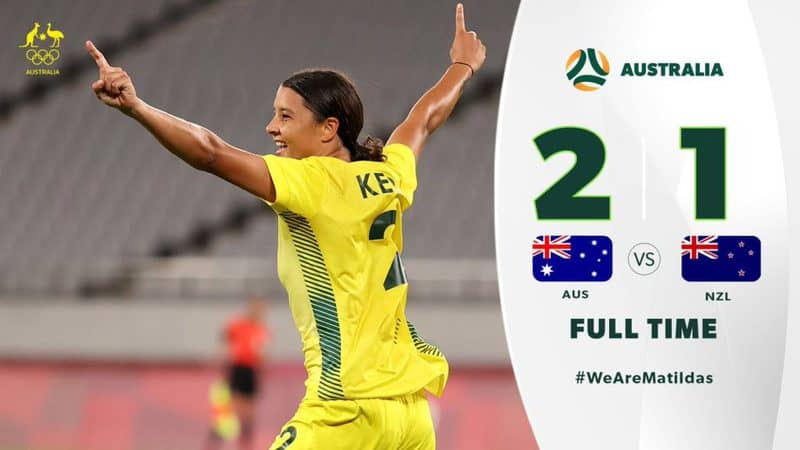
Olympic TV ratings: Wednesday July 21 Day -2
Football
Australia Matildas v New Zealand
860,000 (Metro 590 Regional 270,00)
In addition to the live TV audience, Seven reported:
On Wednesday 7plus set a new record for the number of minutes live streamed this year, at 45.9 million minutes. It was the second biggest event in the history of 7plus, behind the Rio Olympics 2016 (all days).
Fuelled by the Matildas and the Aussie Spirit’s pre-Opening Ceremony matches, the platform captured a 56.1% share of commercial free-to-air live streaming, and a 44.4% share of total (live plus VOD minutes).
Seven West Media chief digital officer, Gereurd Roberts, said: “Even before Tokyo 2020 formally starts, Australians are flocking to 7plus to cheer on their teams.
“Tokyo 2020 will not only be the world’s biggest sporting event, it will also be the biggest digital event in Australian history. If yesterday was any indication – and we think it was – the audiences are going to be enormous.”
See also: Week 30 TV ratings: Olympics mixed with lockdown a bonanza for Seven
Aug 25: Tokyo 2020 Paralympics Opening Ceremony breaks records for Seven
The Tokyo 2020 Paralympics kicked off on the Seven Network last night with the Opening Ceremony breaking records and reaching 1.94 million people.
An average national audience of 953,000 watched the Opening Ceremony on Channel Seven last night, topping the previous record set in Beijing 2008 by 42%.
Last night’s average capital city audience of 643,000 was 38% higher than Beijing 2008.
The Tokyo 2020 Opening Ceremony’s national audience was also more than 10 times bigger than Rio 2016, with the average metro audience more than 12 times bigger.
The Opening Ceremony was #1 in its timeslot last night in total people and in all key demographics.
Managing director Seven Melbourne and head of network sport, Lewis Martin, said: “Last night’s historic viewing figures underline just how much Australians have been looking forward to the Paralympic Games Tokyo 2020.
“The Paralympic Games is among sport’s greatest events and we can’t wait to bring fans all the unmissable action over the next 12 days as our all-star Aussie team takes on the very best in the world.”
Seven’s Paralympics Games Tokyo 2020 coverage is anchored by Australian Paralympics legends Kurt Fearnley and Annabelle Williams, alongside Johanna Griggs, Matt White and Emma Vosti, while Paralympic icons Priya Cooper, Tim Matthews, Jessica Gallagher, Nick Morris and Bryce Alman headline the commentary team.
